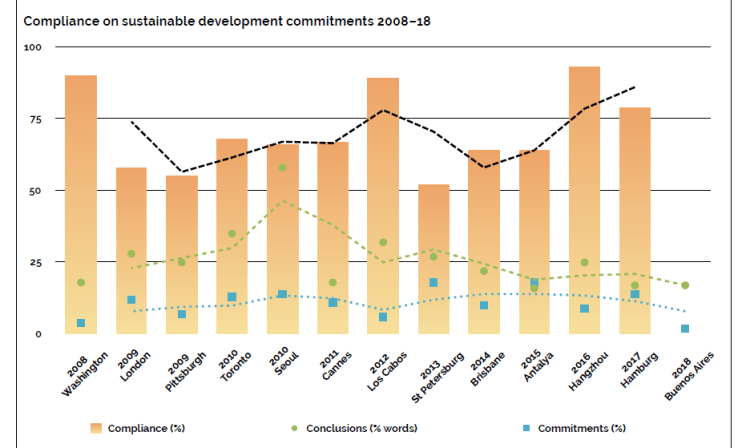Challenge
Proposal
Sustainable development has been a key subject for the G20 since its first summit in Washington in 2008. For the Osaka Summit, Japan has identified seven priority subjects. Sustainable development was listed as one priority but was also featured in related priorities, including infrastructure for development and climate change. Sustainable development, then, is set to be a central topic at the Osaka Summit.
Conclusions
Between 2008 and 2018, G20 leaders have given a notable number of words to development in their communiqués, with an overall average of 26% at each summit. They started off strong, with 18% of the total words dedicated to development at the 2008 Washington Summit. That number increased steadily to 2010 when it spiked to 58% at Seoul. Then came a steady decline. At the Buenos Aires meeting in 2018, sustainable development accounted for 17% of the words.
Commitments
G20 leaders have made 271 commitments on development since Washington in 2008. They began with a modest four commitments at Washington. That number gradually, if not continuously, increased until St Petersburg in 2013, where 50 commitments were made. Then came a steady decline, eventually punctuated with the historic high of 75 commitments at the 2017 Hamburg Summit. The number of commitments plunged to only three at Buenos Aires in 2018. These commitments centred on assisting developing countries and ensuring the implementation of the Millennium Development Goals and then the Sustainable Development Goals.
Compliance
According to assessments conducted by the G20 Research Group, the compliance of G20 members with their development-related commitments made between 2008 and 2017 averaged 70%. This solid compliance with development commitments is just below the G20’s average of 71% on all issues. It started off strong in 2008 with a 90% average. Compliance then dropped to 58% at the 2009 London Summit. It remained relatively steady until it increased to 89% at Los Cabos in 2012. Then it fell to a low of 66% in 2014. Average compliance then increased to peak at 93% with the 2016 Hangzhou commitments.
Compliance was led by the United Kingdom, with average compliance of 88%. It was followed by Germany, with 85%.

Corrections
There appears to be a negative correlation between the number of commitments made at each summit and the subsequent average compliance with them.
For the G20 overall, there is a positive relationship between the number of subject-specific ministerial meetings held before a summit, and compliance. The inclusion of the core international organisations in the text of a commitment also coincides with higher compliance with that commitment. The G20 leaders can therefore improve their performance on sustainable development commitments by holding meetings of the ministers responsible for development before the summit. Compliance would also be improved by including references to the core institutions involved in delivering the Sustainable Development Goals, namely the World Bank and the United Nations.
The views and opinions expressed in this article are those of the authors and do not necessarily reflect the views of the Global Solutions Initiative. This article was originally published in G20 Japan: The 2019 Osaka Summit by GT Media Group and the G20 Research Group, 2019. View the original article.








